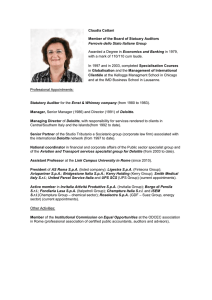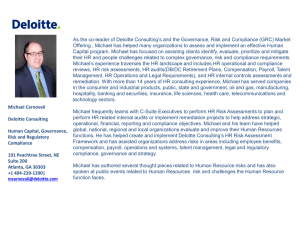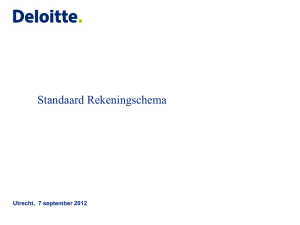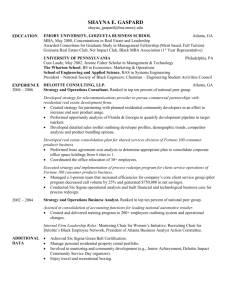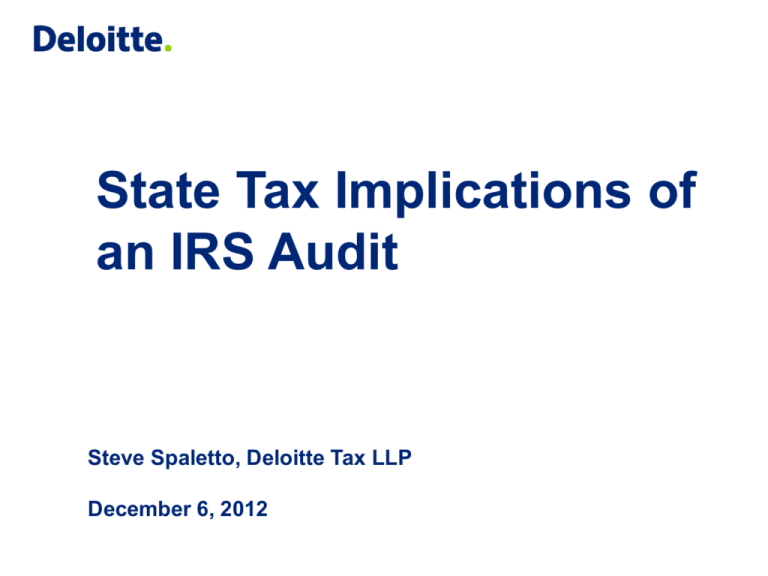
State Tax Implications of
an IRS Audit
Steve Spaletto, Deloitte Tax LLP
December 6, 2012
Agenda
Background: Revenue Agent’s Report
State impact of IRS audit adjustments
State filing requirements and deadlines
Statute of Limitations
Hot Topics / Trends
Q&A
1
Copyright © 2012 Deloitte Development LLC. All rights reserved.
Background:
Revenue agent’s report
Background: Revenue agent’s report
What is a Revenue Agent’s Report?
• When the IRS modifies federal taxable income, a
Revenue Agent’s Report (“RAR”) is issued
summarizing the audit adjustments being made to
previously reported federal taxable income
• What forms are commonly used by the IRS?
– Form 870
– Form 870-AD
– Form 4549
– Form 4549-A
– Closing Agreement
3
Copyright © 2012 Deloitte Development LLC. All rights reserved.
State impact of IRS audit
adjustments
State impact of IRS audit adjustments
• An IRS audit can result in need to file hundreds /
thousands of state amended returns
• What is the impact of an RAR for state purposes?
– Re-determine state tax liabilities taking into account
IRS adjustments
– Impact beyond federal taxable income
•
•
•
•
Modifications
Non-business income
NOLs, credits, and other limitations and carryovers
Apportionment
5
Copyright © 2012 Deloitte Development LLC. All rights reserved.
State filing requirements and deadlines
• What are the deadlines and procedures for reporting
federal adjustments to states?
– Time period for reporting varies by state (30 days to more than
a year)
– Time period for a specific state can also vary based upon:
• Whether federal adjustments result in refund or additional tax due
(Illinois, Iowa, Maryland)
• Whether federal adjustments are related to IRS audit or taxpayer-initiated
filing of federal form 1120X (Oregon)
• Combined versus separate company filing (New York)
– States may require filing of amended returns even if federal
adjustments do not change the state tax liability
• Non-filing may permit statute of limitations to remain open indefinitely
(ASC 740 impact)
6
Copyright © 2012 Deloitte Development LLC. All rights reserved.
Filing format
• Taxpayers must file amended state returns using state
accepted formats and attaching necessary documents
• Amended return form versus an alternative format
‒ Form types: Original, “X” (year specific/generic), IRS specific
‒ Spreadsheet with IRS documents
(may not meet states requirements)
• Attachments to the amended filing
‒ IRS documentation
‒ Original or previous amended filing (exclude for MI)
‒ Other supporting schedules to support the amended filing
‒ File “As Amended” original form in “X” Form states???
‒ Unlike Federal 1120x (exception = IN)
7
Copyright © 2012 Deloitte Development LLC. All rights reserved.
State tax implications of IRS audit
• What constitutes the “final determination” of an IRS
audit?
– “Starts the clock ticking” with respect to states’ time period for
reporting adjustments
– Challenging as many states provide little or no guidance
– States that have a definition often list series of events
(including references to IRS Form 870/870-AD, payment of
tax, etc.)
• Uncertainty often remains regarding what constitutes “agreement”
or “acceptance” / “execution”
– Partial agreements may be viewed as “final determinations”
for agreed items (additional filing burden)
8
Copyright © 2012 Deloitte Development LLC. All rights reserved.
State compliance: Issues and challenges
• Determining starting point (i.e., incorporating
audits/notices and previous state amended returns)
– Impact of lump-sum prior state audit settlements
• Unique and varied forms and addresses
• Impact on state modifications or other items on state
return
• Adjustments may affect later years not currently under
audit by reducing certain carryforward items (e.g.,
NOLs)
9
Copyright © 2012 Deloitte Development LLC. All rights reserved.
State compliance: Issues and challenges
(cont.)
• Quantifying impact of adjustments for members of
consolidated groups
– IRS audit adjustments not “pushed down” to underlying legal
entities
• State amnesty programs (benefits / considerations)
10
Copyright © 2012 Deloitte Development LLC. All rights reserved.
State compliance: Issues and challenges
(cont.)
Penalties and Interest
• Most states apply general penalty provisions
• Interest may apply from the due date of the originally
filed return
• Application of payments and credits can be important
• Request a transcript
• Netting of underpayments and overpayments of tax
and interest between tax years
• Different rates may apply to overpayment /
underpayment
11
Copyright © 2012 Deloitte Development LLC. All rights reserved.
Statute of limitations
Federal statute of limitations waivers
• Generally, the federal statute of limitations on
assessment expires three years from when the tax
return is due or filed, whichever is later
• A claim for credit or refund must generally be filed
within three years from the date the return was filed or
two years from when the tax was paid, whichever is
later
• Taxpayers can waive the statue of limitations through
either an open-ended or a fixed-date consent.
– Both can contain language that limits extension to only one or
more specified issues (which can have state implications)
13
Copyright © 2012 Deloitte Development LLC. All rights reserved.
What is competent authority (“CA”)?
Requested under the Mutual Agreement Procedure
(“MAP”) Article contained in relevant Tax Treaty
• Available when actions of U.S. or treaty country result
or will result in taxation that is contrary to provisions of
the treaty (“double taxation”)
– Adjustment must be initiated by a tax authority, not voluntary
• Only available if U.S. has Tax Treaty with relevant
country
– MAP Article broader than just transfer pricing
– Many treaties contain time limits for requesting relief (typically
beyond normal statute of limitations)
14
Copyright © 2012 Deloitte Development LLC. All rights reserved.
State impact of CA agreements (“CAA”)
• If a CAA does not require a taxpayer to amend its
federal tax return and if related adjustments are not
rolled into an ongoing IRS audit, no state amended
returns are necessary, but prospective changes must be
tracked.
• When a CAA requires a taxpayer to amend its federal
tax return:
– If the “normal” federal/state statutes of limitations are open,
taxpayers follow traditional state amended return procedures.
– If the state statute of limitations on assessment has closed,
the state statue may not automatically reopen by virtue of the
reopening of the federal statute of limitations.
15
Copyright © 2012 Deloitte Development LLC. All rights reserved.
Competent authority – protective claims
• Any U.S. CAA will be implemented notwithstanding
any time limits or other procedural limitations in the
domestic law of either country.
• A CA request can be treated as a protective claim.
– Statute of limitations on assessment can expire if U.S. CA
assistance is declined or if no agreement is reached.
• Some other protective measures include:
– filing protective claims for refund or credit;
– extending any period of limitations on assessment or refund;
– avoiding the lapse or termination of right to appeal; or
– contesting an adjustment or seeking an appropriate correlative
adjustment with respect to the U.S. or treaty country tax.
16
Copyright © 2012 Deloitte Development LLC. All rights reserved.
State implications of federal waivers
• Limited State Guidance
–
–
CA: Unrestricted waiver opens entire year for 6 months beyond
federal
St. Louis: Federal waiver not respected (refunds must be
claimed within 3 years; tax due assessed within 5 years)
• State Statutes of Limitations Provisions
–
–
–
General statute of limitations (Typically 3 or 4 year
statute)
Statute of limitations applicable to a federal waiver
State of limitations applicable to the filing of an
amended return
• Considerations
–
–
Which statute applies?
Can adjustments other than RAR be incorporated?
17
Copyright © 2012 Deloitte Development LLC. All rights reserved.
Hot topics / current trends
Hot topics / trends
• Refund denials
– Definition of final determination
– Reporting self-initiated / federal form 1120X adjustments
– More stringent requirements regarding forms, schedules, and
attachments
• Assessment of penalties
• Compliance Assurance Process
– Similar state reporting and filing obligations apply
• Increased scrutiny regarding forms and attachments
• E-filing
19
Copyright © 2012 Deloitte Development LLC. All rights reserved.
Question and answer
Contact
Steven Spaletto, Deloitte Tax LLP
Director, Indianapolis
(317) 656-2430, sspaletto@deloitte.com
21
Copyright © 2012 Deloitte Development LLC. All rights reserved.
About this presentation
This presentation contains general information only and Deloitte is not, by means of this presentation, rendering accounting,
business, financial, investment, legal, tax, or other professional advice or services. This presentation is not a substitute for
such professional advice or services, nor should it be used as a basis for any decision or action that may affect your
business. Before making any decision or taking any action that may affect your business, you should consult a qualified
professional advisor. Deloitte shall not be responsible for any loss sustained by any person who relies on this presentation.
22
Copyright © 2012 Deloitte Development LLC. All rights reserved.
About Deloitte
Deloitte refers to one or more of Deloitte Touche Tohmatsu Limited, a UK private company limited by guarantee, and its network of
member firms, each of which is a legally separate and independent entity. Please see www.deloitte.com/about for a detailed
description of the legal structure of Deloitte Touche Tohmatsu Limited and its member firms. Please see www.deloitte.com/us/about
for a detailed description of the legal structure of Deloitte LLP and its subsidiaries. Certain services may not be available to attest
clients under the rules and regulations of public accounting.
Copyright © 2012 Deloitte Development LLC. All rights reserved.
Member of Deloitte Touche Tohmatsu Limited

